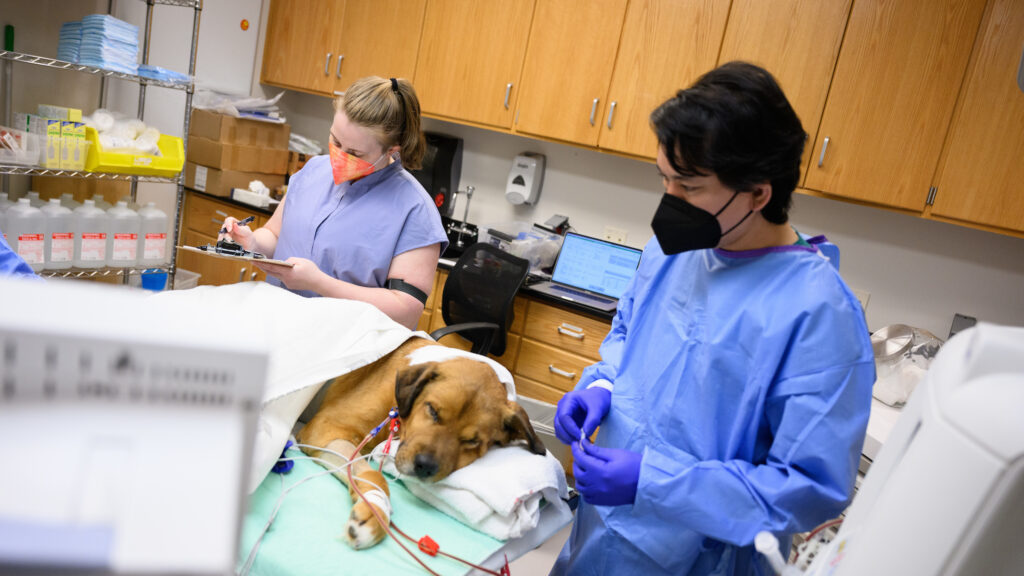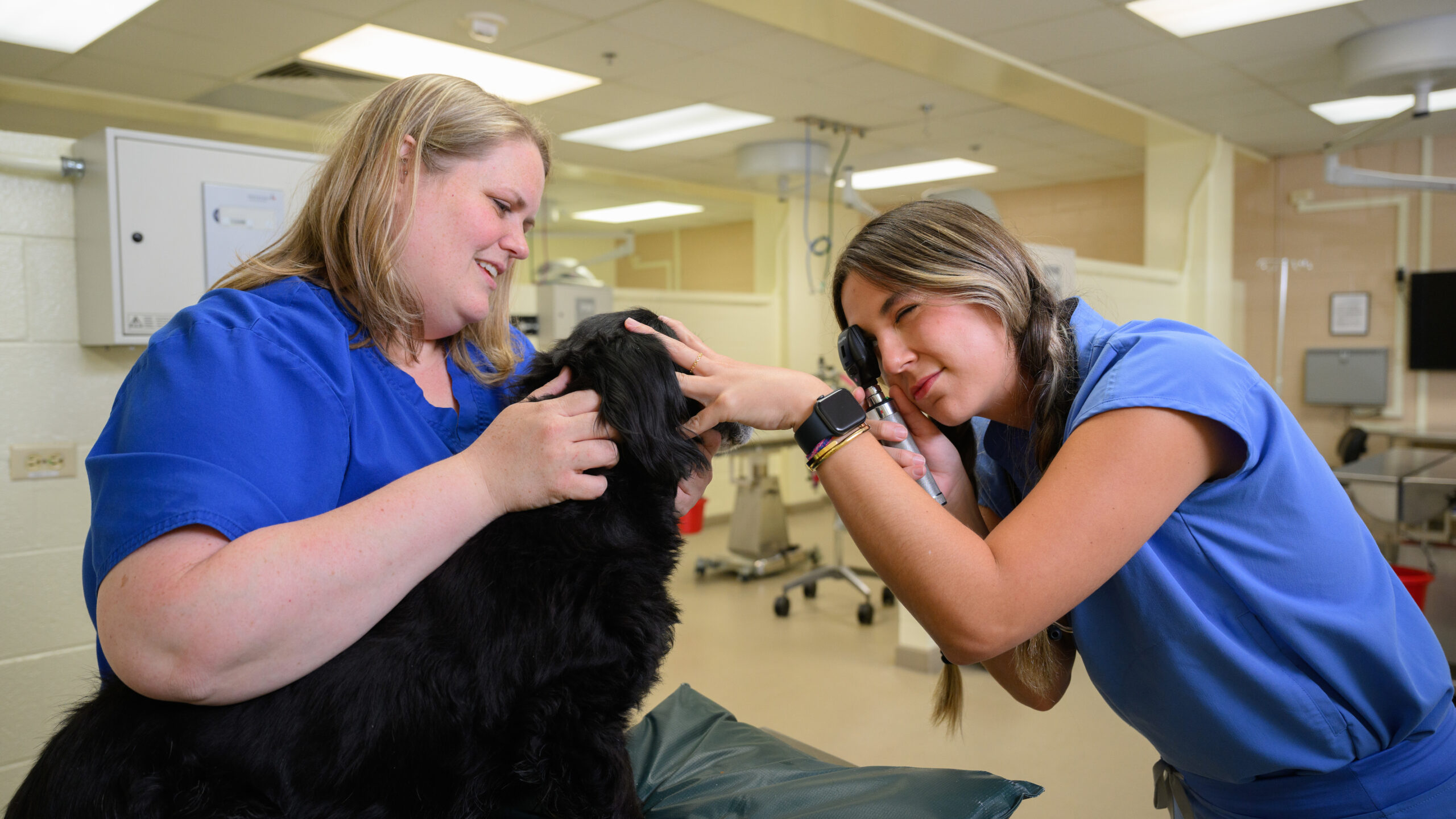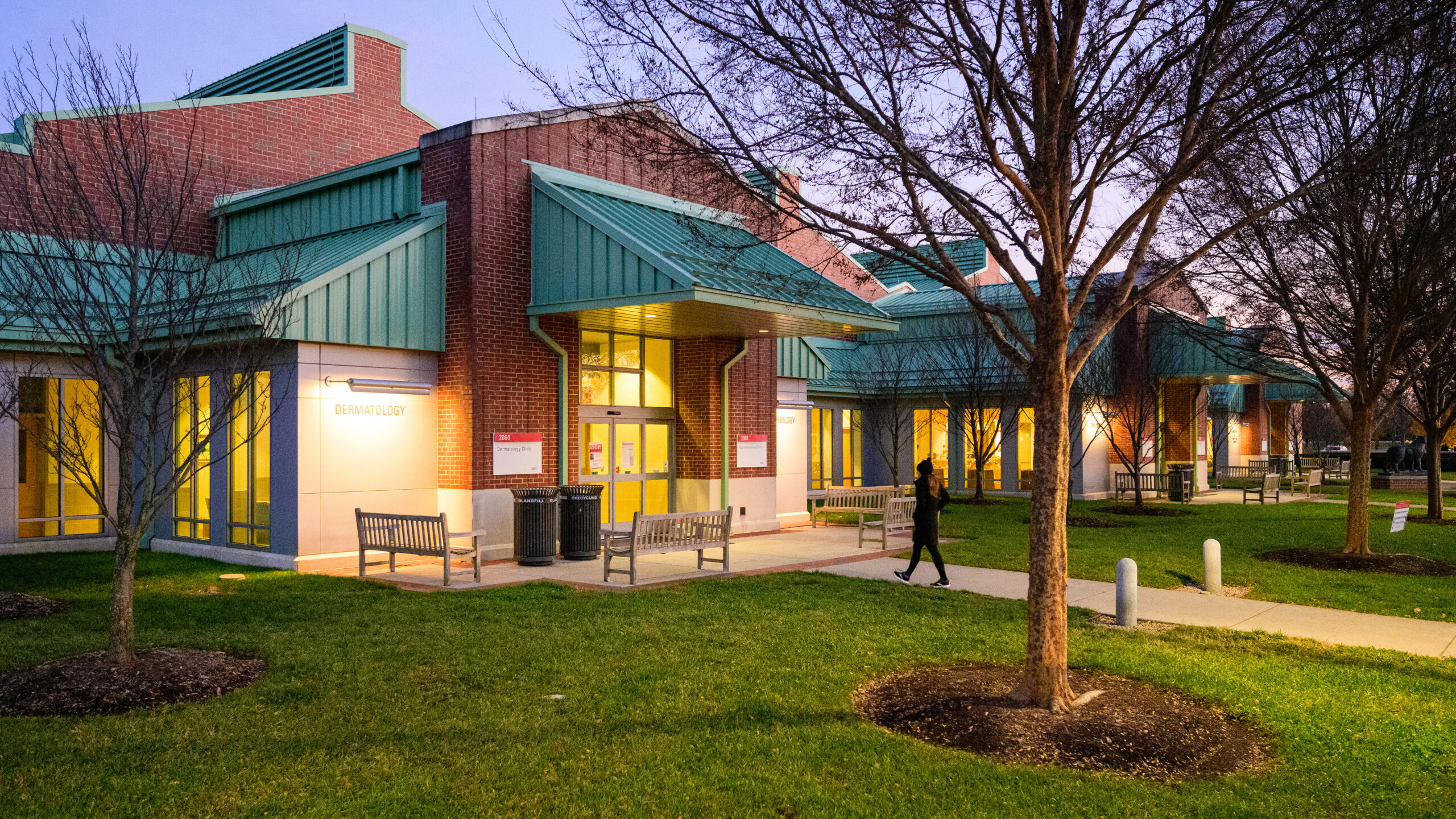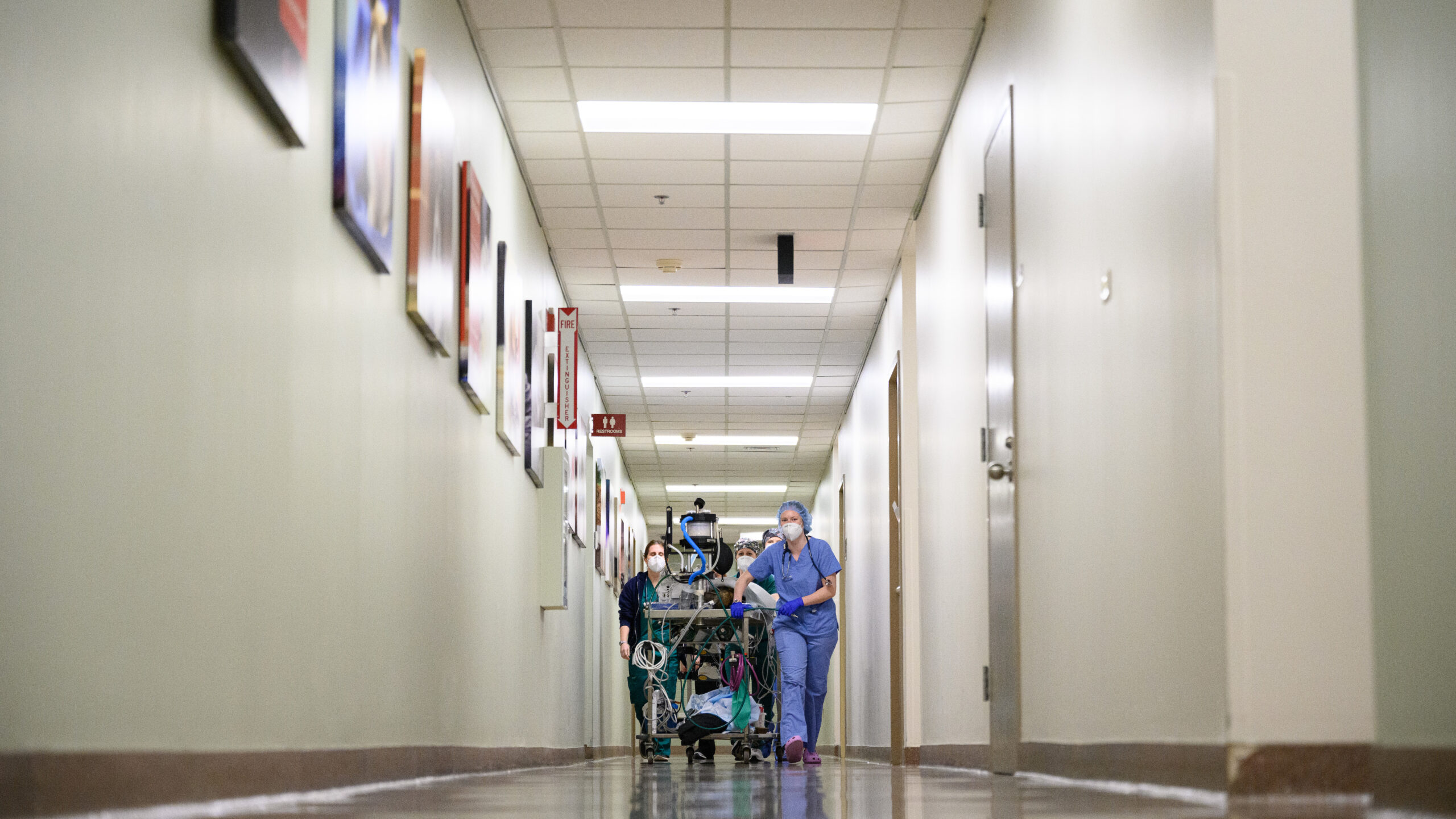Nephrology and Urology Service
Nephrology/Urology is a subservice within the Internal Medicine Service at the NC State University Veterinary Hospital specializing in the diagnosis and management upper and lower urinary tract problems of dogs and cats.

Overview
This service provides state-of-the-art diagnostic and therapeutic services for animals with common and rare urinary tract disorders. The Nephrology/Urology Service is operated by specialists in Internal Medicine, Critical Care and Nephrology and Urology, all with expertise in the urinary tract. The newly formed American College of Veterinary Nephrology and Urology (ACVNU) focuses on the advancement of care for disorders of the urinary tract in dogs and cats. The specialists at the VH are innovators within their field, trained in advanced new techniques, and up to date on recent advances. If the doctor feels that a new procedure or technique will benefit the patient, the implications will be discussed with the owner in depth so that they have all the information necessary to help decide whether or not the pet will participate in any on-going study. The patient’s health and comfort is the primary factor in all decisions.
Our department specializes in conditions affecting the upper (kidneys, ureters) and lower (bladder, urethra) urinary tract including:
- Chronic kidney disease
- Acute kidney injuries
- Glomerular disease and proteinuria
- Hypertension
- Recurrent urinary tract infections
- Urinary incontinence
- Inability to completely void urine
- Urinary tract stones
- Feline idiopathic cystitis (FIC)
- Prostatic disease
- Urinary tract tumors (diagnosis)
- Excessive thirst and urination (polyuria/polydipsia )
- Congenital diseases of the lower urinary tract
Contact Us
- Hours: Monday through Friday, 8 a.m to 5 p.m
- Phone: 919-513-6670
- Email: NCStateInternalMedicine@ncsu.edu
Specialized Services
Our department also offers a wide array of specialty interventions and management including:
- Diagnostic and therapeutic scoping (cystourethroscopy) of the lower urinary tract and urogenital tract
- Minimally invasive stone removal
- Laser lithotripsy
- Basket retrieval
- Voiding urohydropropulsion
- Minimally invasive correction of ectopic ureters
- Urethral bulking for female urinary incontinence
- Urethral and ureteral stenting and ballooning for malignancies, strictures, obstructions, or infections
- Endoscopic sclerotherapy for idiopathic renal hematuria
- Transurethral resection/debulking of bladder and urethral tumors (TURBT)
- Management of SUB (subcutaneous ureteral bypass) devices
- Management of hydraulic occluders for refractory urinary incontinence
- Hemodialysis for acute or acute on chronic kidney injury
- Apheresis for immune-mediated diseases
- Extracorporeal therapy for toxin removal
What to Expect
We operate as a specialty referral service, which means all clients require a referral from their primary veterinarian. We utilize a team approach to patient care which includes a senior veterinary student, resident (DVMs undergoing advanced training in internal medicine) and fellow (internal medicine specialist undergoing advanced training in nephrology and urology), and faculty member in conjunction with the primary veterinarian.
Patients are admitted at the front desk of the Small Animal Hospital located in the Terry Center. After the patient has checked in, a Clinical Technician will take the owner(s) and patient to an exam room. A senior veterinary student will enter the exam room to obtain a complete medical history and perform a physical examination on the pet. Due to the fact that we are a Teaching Hospital, it is very important to provide the students with this experience so they can provide the best care possible to their future patients and, in doing so, maintain the high standards of the veterinary profession.
The student will then leave the room to discuss the case with the attending veterinarian(s), (Resident, Fellow, and Faculty), which may take up to 45 minutes. The student and the doctors (often the entire team) will then return to the exam room to discuss their recommendations for the pet. Owners should be prepared to spend 2-4 hours with us for the initial appointment. If the pet needs a specialized procedure or imaging, the owner should expect for it to be performed on another day, often the subsequent day. Select patients, such as those with acute kidney injury, toxicity or certain immune mediated diseases, will need to be seen through the emergency service and transferred to the nephrology/urology service.
Appointments and Referrals
Appointment Guidelines
If you do not have a referral and you would like your pet seen by a specialist, ask your veterinarian to set up the referral. The Nephrology Urology service cannot provide advice to clients over the phone for patients we have never seen. We may be able to facilitate an appointment or provide a small amount of general information. It is often difficult to judge the correct approach to a situation without the opportunity to gather a complete history and directly examine the patient. When calling, please keep in mind that due to the high volume of cases seen we may not be able to answer the phone, please leave a message and your call will be returned as soon as possible.
Please bring copies of your pet’s medical records from any veterinarian who has seen your pet for the referred problem. Also bring any diagnostic test results, including blood tests, radiographs, ultrasounds, and biopsies.
Appointment Hours
The Nephrology Urology service is a referral only service available Monday through Thursday. Please have your primary veterinarian contact us by phone or fax with the referral information. After the referral is made, you can call 919-513-6670 to schedule your appointment.
Frequently Asked Questions
When am I going to see a doctor?
Please note that our Interns and Residents (aka House Officers), are fully licensed doctors with the same education and credentials as a general practitioner. There will ALWAYS be a doctor in charge of and supervising all aspects of patient care at the VH. In many cases multiple specialists may consult on a patient should their expertise be required. Typically, a fourth-year student will first collect a detailed history and present this information to the doctor in charge. You will then have an opportunity to discuss things in detail with the doctor and together you and he/she will formulate a diagnostic and treatment plan.
What does it mean to be a ‘teaching hospital’?
In addition to having access to cutting edge diagnostic tools and therapeutic alternatives, the most unique aspect of our facility is that every patient is a learning opportunity for our students. Much of this teaching is done ‘behind the scenes’ as we discuss your pets’ diagnostics and care. What this means to you, the client, is that the process may take somewhat longer than it would at a private veterinarian practice. However, this also means that we have the ability to consult with multiple doctors and a variety of specialists in complex cases.
My doctor introduced him/herself as an Intern or a Resident – what does that mean?
It is important to understand that every intern or resident at the VH is a fully licensed doctor with the same education and credentials as a general practitioner. Interns and residents have chosen to pursue additional, in-depth postgraduate clinical training and were selected by us in a highly competitive international application process. We think you are in great hands!
Is there food and water available for my pet while I wait?
Feel free to ask the front desk for a bowl if you would like to offer water to your pet. However, we do ask that you refrain from feeding your pet. Many procedures require sedation or medication with drugs that could upset your companion’s stomach if there is food present. If your pet must eat for medical reasons (eg. diabetes), please ask the front desk to inform the doctor in charge and make sure they are aware of this first.
I am finished with my visit, why do I have to wait?
One of our goals for our clients is that everyone leaves with detailed discharge instructions. We write our discharge instructions in as detailed manner as possible to help summarize the information covered during the visit and give you specific instructions as to medications, diet, activity restriction, and any other pertinent aspect of care. It may take us some additional time to write these for you; however, this can significantly ease the transition home and back to your regular veterinarian.
You are a State facility, so why are your fees so high?
The VH is a not for profit health care center and receives less than 2% of operating costs from the the State of North Carolina. The majority of our operating costs are paid by client fees and donations. In fact, many of the state-of-the-art diagnostic and treatment options we offer are only possible because of generous gifts from our clients. Our fees are set to cover the balance of our operating costs, and we are always looking for ways to provide better service at lower cost. Total costs are comparable to those of veterinarian specialists in private practice.
Resources
Here are some links that can help in finding a primary vet.


